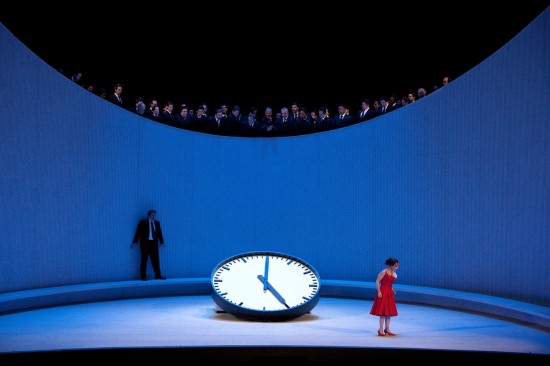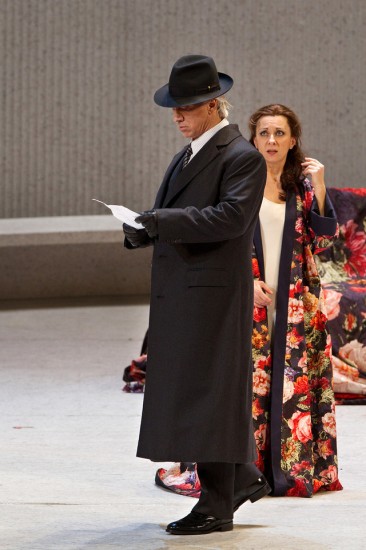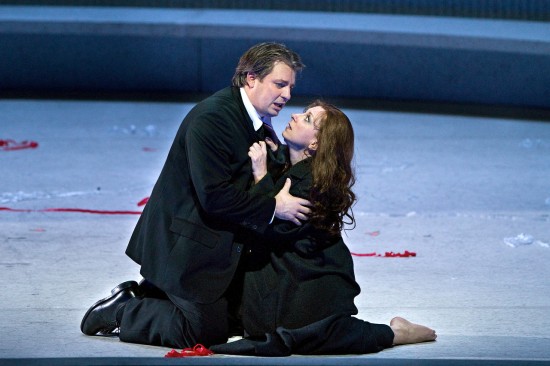I have just seen the MetHD Encore performance of Willy Decker’s stunning production of Verdi’s La Traviata, having had to miss the Live performance on April 14, 2012. Writing a review after the final performance (both the HD and the Lincoln Center held their final performance today, May 2, 2012) has one distinct advantage. You, the reader, have either already seen it or you never will see it. Therefore, I don’t have to think about my review possibly influencing your decision, but can simply unburden myself of my own feelings after seeing it.
Here’s what I went in with. I had seen and reviewed 5 different productions of La Traviata in the past two years – many of them more than once. (Read my other reviews on my blog, or go to Splash and type “traviata opera nut” in the search box in the upper right corner.) I had seen the trailers at previous MetHD opera performances, and I had seen the 13 pictures in the Met’s press room. I had not read any other reviews. Sara was the only person I talked to who had seen the Live performance, and her only comment was, “I can’t wait to read your review,” with no hint as to whether she expected rapturous adoration or scathing denunciation.
As I took my comfortable seat in the Palo Alto Cinemark theater, my mood was one of cautious optimism. The settings of my other Traviata‘s had all been more-or-less conventional, and it was obvious from the pictures that this was going to be different. OK; if you don’t mess with the music or the plot, I can use some variety in the setting. Besides, the Opera San Jose production of Faust that I had seen last week had shown me that a minimalist setting could be extremely effective.
The miming on stage during the overture (and the stage itself) immediately established the fact that this performance of La Traviata would be different. Other Violettas – notably Danielle Talamantes with Fremont Opera and RenÉe Fleming with ROH – have used the overture to show how tired and sick Violetta is when she is alone in the ballroom, but can still snap into her party face when company arrives. Here, the curtain rises on a semi-circular arena-like bare space with Natalie Dessay closing the only door and a mysterious male figure on the other side of the stage. At the first intermission Letha Ann asked, “Who or what is the mysterious figure?” Charles said that it represented Father Time. My thought was more specific: Death.
When the door is closed, it is invisible and the illusion is complete. Violetta is trapped in this arena, and she knows there is no escape. Director Willy Decker has wasted no time setting the theme of his production. Violetta is doomed to die in the near future. She knows it and she is terrified. She appeals to Death, silently and without hope. She throws herself against the giant clock on the wall in a vain attempt to halt the inexorable march of Time.
Suddenly the door bursts open and dozens of guests stream in. Every single one is apparently a male, but when they start to sing we hear Verdi’s full complement of sopranos and mezzos. Quickly, Violetta puts on her red party dress and turns around to show her party face. But whereas Talamantes and Fleming appeared to have donned a whole party personality, Dessay has only put on a mask. There is something about her stance – her motions – that shows she is only pretending to be gay – underneath she is still haunted by her approaching death.
At the end of Act I my verdict is, “I like it so far.” Matthew Polenzani’s Alfredo seems more like a stolid reliable sort than a dashing young lover, but there’s nothing wrong with his voice. During intermission host Deborah Voigt interviewed the two leads together, and it seemed that Dessay was still wearing some of her stage persona. I remembered her from previous interviews as being full of life, bubbling, and overflowing with good humor. Here she seemed relatively subdued – a little tired. I heard later that she had actually had a cold on the day of the performance. That explains, I hope, why her voice did not seem quite up to the high standard I expected.
The curtain goes up for Act II, Scene 1, and we see exactly the same semi-circular arena as before – indeed, that feature will remain for the entire opera. However, the mood is quite different. There are 4 or 5 chairs and sofas scattered about, all of them covered a striking colorful floral print, and the two lovers are clad in magnificent matching robes – usually worn half open to reveal only underwear beneath them. Quite a contrast to the boots and hunting jacket worn by Joseph Calleja in the ROH production!
I was looking forward to seeing Dmitri Hvorostovsky portray a Germont that I could really hate. Alas, I was disappointed. He was, of course despicable in Act II, but he didn’t seem to have his whole heart into it. Similarly, in Act III his body language neither confirmed nor denied his apology.
I think that Verdi inserted the matador ballet at the beginning of Act III to provide a break from the intense emotions at the end of Act II and the quite different emotions of the final death scene. Decker obviously had something else in mind. Immediately after the last notes of Act II we are in a nightmare scene with the all male-attired dancers and chorus sporting ugly masks and tormenting first Alfredo and then Violetta. The scene had no appeal for me.
Eventually everyone else cleared out leaving only Violetta lying on the floor – which had a few blood-stains on it from the nightmare – and Annina (Maria Zifchak) motionless at the rear rim of the arena. There was absolutely no scenery except the clock on the wall – not even a deathbed. Oh, and the mystery of Father Time was resolved – it was Dr. Grenvil, (Luigi Roni)!
I wish that the intermission had included an interview with Director Willy Decker. I would have liked hearing his vision of the opera in his own words. Lacking that, I can only give you my guess, based on my interpretation of what I saw:
This is the story of the tragic last few months in the life of Violetta. As in a Greek tragedy, the bitter conclusion is fore-ordained from the opening notes of the orchestra. Violetta is intensely aware of her doom and the opera is about her thoughts, feelings, and emotions as the end nears. Other characters are present only because of the effect they have on Violetta.
This interpretation was certainly supported by the ever-present clock and the Death figure. It also explained the diminution in the roles of the two Germonts, and the almost complete absence of the other usual supporting figures. Decker would probably have liked to eliminate them completely, but he couldn’t go that far since Verdi had given them some lines to sing. But Flora was just one of the “gentlemen”, and the maid Annina had a featureless face, was dressed totally in shapeless black, and was usually physically distant from Violetta.
Through Acts I and II, I was willing to grant that Decker was doing a good job with his interpretation – even if I didn’t like the interpretation. But when Death opened his mouth to sing Dr. Grenvil’s words of comfort to Violetta, I was totally confused. I still am, for that matter.
I’m glad I saw this performance, but if the Met shows another encore some summer, I’ll stay home that night. Whereas I’d jump at a chance to see any of the other 5 productions again. You can’t win ‘em all.
Live in HD
metoperafamily.org
Photos, except as noted: Ken Howard/Metropolitan Opera
3000 El Camino Real
Palo Alto, CA 94306
1-800-FANDANGO Exp Code 914
Cast and Production Team
Alfredo
Germont
Flora
Gastone
Baron Douphol
Marquis D’Obigny
Dr Grenvil
Annina
Giuseppe
Messenger
Guest
Gentleman
Conductor
Production
Designer
Associate Costume Designer
Lighting Designer
Choreographer
TV Director
Matthew Polenzani
Dmitri Hvorostovsky
Patricia Risley
Scott Scully
Jason Stearns
Kyle Pfortmiller
Luigi Roni
Maria Zifchak
Juhwan Lee
Joseph Turi
Athol Farmer
Peter Volpe
Fabio Luisi
Willy Decker
Wolfgang Gussmann
Susana Mendoza
Hans Toelstede
Athol Farmer
Gary Halvorson
This review by Philip G Hodge appeared in sanfranciscosplash.com on May 6, 2012.







